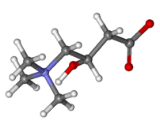Carnitine (CNT)
VB20; Vitamin B20

Carnitine is a quaternary ammonium compound biosynthesized from the amino acids lysine and methionine. It is required for the transport of fatty acids from the cytosol into the mitochondria during the breakdown of lipids for the generation of metabolic energy. Carnitine was originally found as a growth factor for mealworms and labeled vitamin Bt. Carnitine exists in two stereoisomers: Its biologically active form is L-carnitine, whereas its enantiomer, D-carnitine, is biologically inactive. carnitine is biosynthesized primarily in the liver and kidneys from the amino acids lysine or methionine. Vitamin C is essential to the synthesis of carnitine. During growth or pregnancy, the requirement of carnitine might exceed its natural production. Carnitine transports long-chain acyl groups from fatty acids into the mitochondrial matrix, so they can be broken down through β-oxidation to acetyl-CoA to obtain usable energy via the citric acid cycle.
